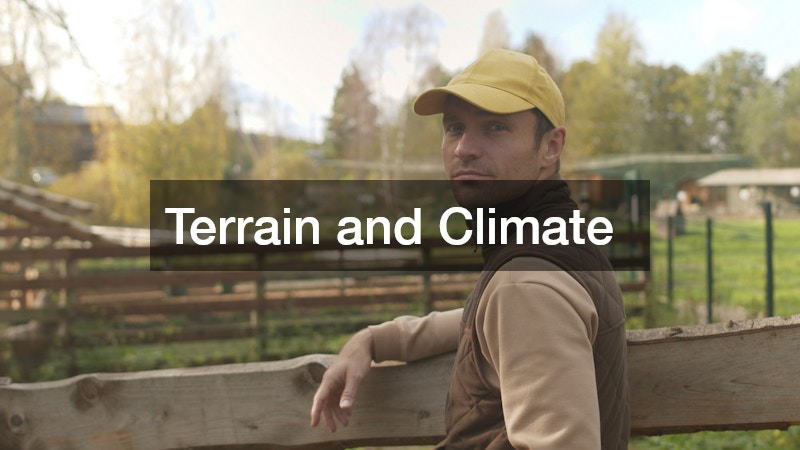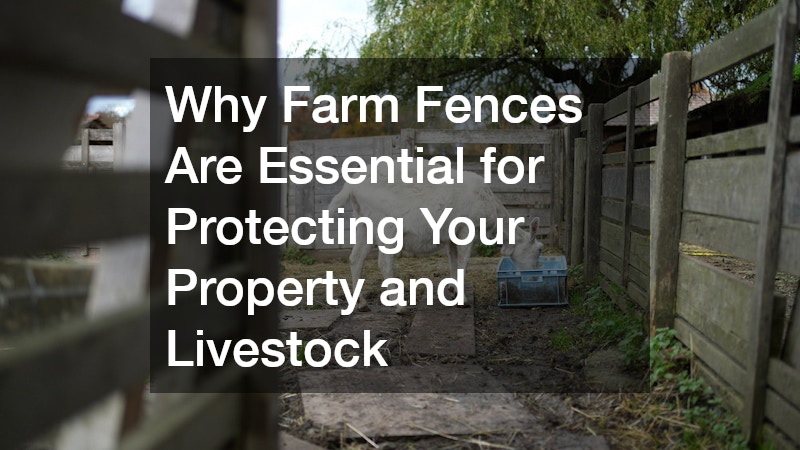Farm fences are crucial components in the agricultural landscape, providing essential security for both property and livestock. As the farming industry evolves, there is growing interest and concern among property owners and farmers about the best methods for protecting their investments. This article explores the various ways farm fences contribute to safeguarding farmland and livestock, responding to the escalating queries and needs of modern agricultural communities.
How Farm Fences Provide Security
Preventing Unauthorized Access
Farm fences serve as the first line of defense against trespassers, intruders, and unauthorized access to farmland. They act as physical barriers that define property boundaries, which helps reduce incidents of theft and vandalism. Properly installed fences can effectively dissuade potential burglars, offering peace of mind to property owners concerned about the safety of their assets.
In addition to deterring theft, farm fences can also prevent other forms of unauthorized access, such as unwanted visitors who may not respect land privacy. By controlling entry points and providing a visible indication of ownership, fences contribute to maintaining order and safety within rural communities. The presence of a well-constructed fence often compels potential trespassers to reconsider their actions due to the symbolic and literal barriers it presents.
Moreover, farm fences address liability concerns by minimizing accidental access that could lead to injuries or property damage. With defined perimeters, landowners can control and monitor access more effectively, ensuring that only authorized personnel or guests enter the property. This proactive management of land access is vital in maintaining a secure and safe environment for all involved parties.
Safeguarding Livestock
Reliable fences are indispensable in ensuring that livestock remains safely contained within designated areas. By preventing animals from wandering off, fences help avoid potential losses and the associated costs of replacing strayed livestock. Moreover, well-built fences reduce the risk of animals getting entangled in hazardous situations or accidentally harming themselves.
Fences also play a critical role in shielding livestock from predator attacks. Solid and sturdy fencing systems, such as electric fences, offer effective deterrence against predators that might otherwise threaten farm animals. By minimizing the risk of predator intrusion, fences help to ensure the well-being and productivity of livestock, which is crucial for farm profitability.
Furthermore, farm fences facilitate controlled grazing and pasture rotation, promoting better land management. By keeping livestock contained, farmers can optimize grazing patterns, preserving pasture health, and enhancing soil quality. This sustainable approach to land use contributes to the overall productivity and resilience of farming operations.
Types of Fences Suitable for Farms
Wood Fences
Wood fences have long been a staple of traditional agricultural landscapes due to their aesthetic appeal and functional benefits. Known for their durability, wood fences can withstand various weather conditions, providing consistent protection for both property and livestock. Ideal for defining borders and containing larger animals, wooden fences offer a classic charm that complements the rustic ambiance of farmland.
Despite their numerous advantages, maintaining wood fences requires regular upkeep to ensure longevity. Treatments like sealing and staining can help protect wood from moisture and rot, thereby extending its lifespan. When considering wood fences, farmers must weigh their preference for natural beauty against the associated maintenance responsibilities.
Electric Fences
Electric fences have gained popularity as a modern solution for effective farm management, boasting several advantages over traditional fencing methods. Their low maintenance requirements and adaptability make them an appealing choice for property owners aiming for efficient livestock containment and predator deterrence. Electric fences use a mild electrical current to create a psychological barrier, discouraging animals and potential intruders alike.
In terms of livestock control, electric fences are highly effective in teaching animals to respect boundaries with minimal physical barriers. This adaptability is especially beneficial in rotational grazing systems, where flexibility and quick adjustments are vital. Farmers also appreciate the ability to modify and expand electric fencing systems as their agricultural needs evolve.
Factors to Be Considered When Choosing a Farm Fence
Cost and Budget
When selecting a farm fence, understanding the initial costs and long-term financial implications is crucial. Different fence materials and designs carry varying price tags, impacting the overall budget for farm improvements. While more expensive options like electric fences might require a larger upfront investment, their reduced maintenance costs could provide better value over time.
Cost considerations should also account for potential repairs and replacements that may arise with age and usage. Regular evaluations of fence conditions can help farmers anticipate maintenance needs and plan their budgets accordingly. In choosing the most suitable fence, it is crucial to align financial resources with practical requirements for farm operations.
Terrain and Climate
The diverse geographic features and weather conditions of farmland can heavily influence the choice of fence materials and designs. Terrain variations such as uneven ground, slopes, or water bodies may necessitate specific fencing designs to accommodate these challenges. For instance, electric fences may be more suitable for hilly areas, as they adapt more effortlessly to fluctuating landscapes.
Climate conditions, including precipitation, temperature fluctuations, and wind exposure, can impact fence durability. Certain materials, such as metal or pressure-treated wood, may offer greater resilience against harsh climates compared to untreated wood. Careful consideration of local environmental factors ensures the chosen fence type will perform effectively under specific climate stresses.
Farm fences are indispensable tools in ensuring the smooth functioning and security of agricultural operations. By preventing unauthorized access, safeguarding livestock, and accommodating diverse terrain and climatic needs, they play a vital role in the agricultural sector. As farmers continue to seek effective solutions for protecting their land and livestock, considering various fencing materials and designs ensures optimal performance and sustainability for future endeavors.






